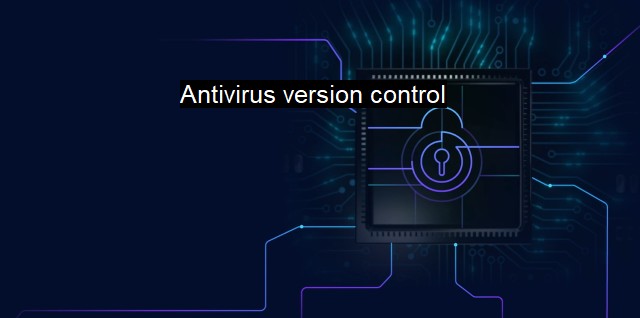What is Antivirus version control?
Antivirus Version Control: A Vital Component for System Security and Efficiency
Antivirus version control is an essential part of computer security. Many computer users perhaps do not realize that their general cybersecurity practices may not suffice if they do not regularly upgrade their antivirus software. This article will delve into the concept of antivirus version control and explain why it is vital for computer security.Simply put, antivirus version control refers to the systems set in place to manage different versions of antivirus software. This involves regular updates, upgrades, and sometimes major overhauls to the antivirus software. These changes are valuable in protecting the security of your computer or compute network because they ensure that your software stays up-to-date with the latest threats, vulnerabilities, and fixes.
With waveform after waveform of cyber threats emerging each day, maintaining the latest strains of an antivirus is not just useful – it is absolutely essential. Cybersecurity criminals are continuously crafting new malware and refining existing ones to exploit any perceived weakness in a system. The only way to counteract these evolving threats is to ensure that the most effective and recent antivirus version is in place.
Antivirus version control helps tackle these threats through a continuous assessment of malware and risk trends and obtaining an updated data bank of the same. Antivirus manufacturers assess this bank of data to create a malicious code, sort out online leads, identify detectable patterns, and update their antivirus software versions consequently.
For enterprise-level implementations, the implementation of antivirus version control works differently. Typically, they utilize an enterprise antivirus management tool, allowing the information technology (IT) department to regulate the antivirus programming across all devices. Effective version control deployment makes sure that all computers in the system are safeguarded with the same level of security, preventing any weak link in the network that could be exploited by cybercriminals.
Antivirus version control is not just about upgrading to the latest software. In many cases, these updates may contain patches for vulnerabilities discovered in prior versions. Commonly, cybersecurity criminals are aware of these weaknesses and may attempt to exploit them before users update their software. Hence, this makes quick and frequent updates an imperious necessity.
Antivirus version control allows for a different type of control, that is 'rollback'. When an upgrade leads to instability in the system or for some reason is not compatible with the system, the option to rollback, or revert, to a previous stable version is invaluable.
Antivirus version control in a cybersecurity context refers to the ensuring, managing, and maintaining up-to-date versions of antivirus software. This is necessarily done to protect systems from existing and emerging cyber threats. Delaying updates or using outdated versions run a high risk of exposure to hackers and other forms of cyber threats. Consequently, a key element of any cybersecurity strategy should include regularly scheduled updates and patches as part of antivirus version control. The process not only includes initial installation, updates, and upgrades but also the capability to revert back to a more stable version if necessary.
The importance of antivirus version control can therefore not be underestimated. It serves to benefit both individuals and organizations by providing the ability to keep up with the fast-paced world of cyber threats. Whatever the size or scope, any computer or network is only as strong as its weakest piece of code. For this reason, keeping your antivirus software regularly updated through effective version control is of the utmost importance in maintaining robust cybersecurity health.

Antivirus version control FAQs
What is antivirus version control?
Antivirus version control is the process of managing and tracking changes made to antivirus software over time. It involves keeping track of different versions of the software, documenting changes, and ensuring that everyone is using the latest version.Why is antivirus version control important?
Antivirus version control is important because it helps organizations to maintain the integrity and effectiveness of their antivirus software. By keeping track of changes and ensuring that everyone is using the latest version, organizations can better protect themselves against the latest security threats.What are some best practices for antivirus version control?
Some best practices for antivirus version control include keeping detailed documentation of changes, establishing a clear process for updating and deploying new versions of the software, and testing new versions thoroughly before deploying them to production environments.What are some common challenges associated with antivirus version control?
Some common challenges associated with antivirus version control include managing multiple versions of the software across different devices and platforms, ensuring that updates are deployed in a timely manner, and dealing with compatibility issues between different versions of the software.| | A | | | B | | | C | | | D | | | E | | | F | | | G | | | H | | | I | | | J | | | K | | | L | | | M | |
| | N | | | O | | | P | | | Q | | | R | | | S | | | T | | | U | | | V | | | W | | | X | | | Y | | | Z | |
| | 1 | | | 2 | | | 3 | | | 4 | | | 7 | | | 8 | | |||||||